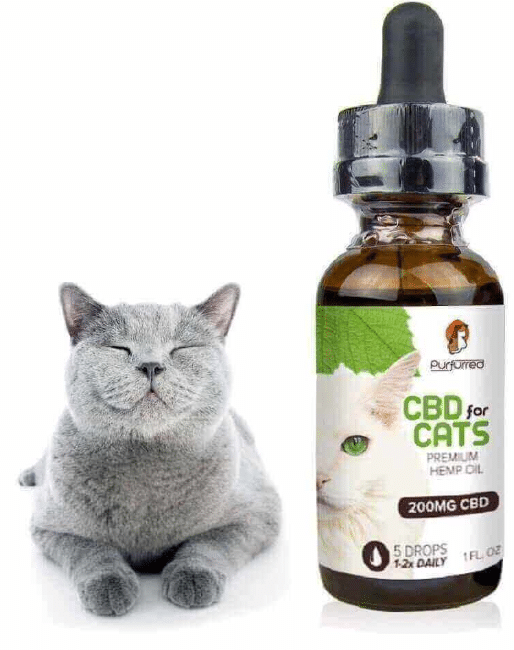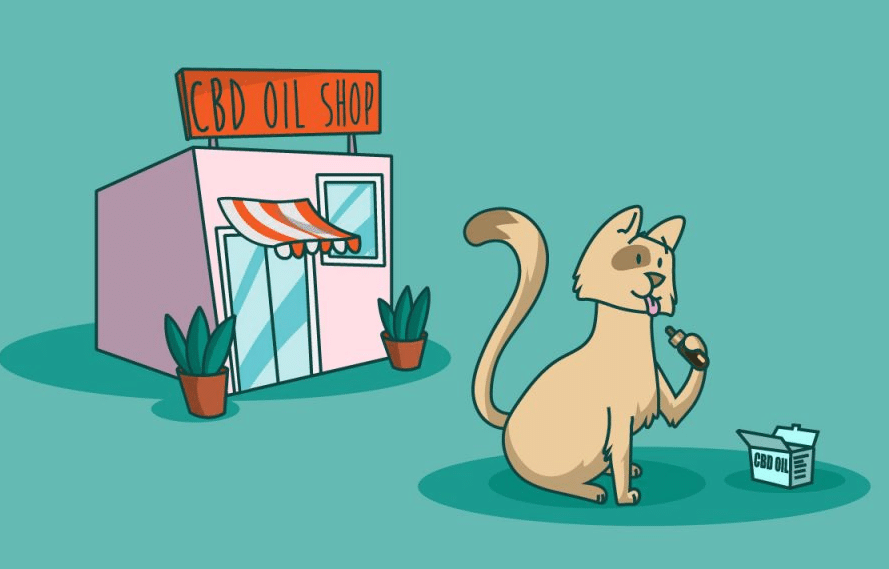CBD Oil For Cats Skin Conditions
CBD Oil For Cats: A common concern among many cat owners is how to help their cats manage anxiety. For some cats, it takes something big to create anxiety and for others, even the smallest changes in daily life can cause upheaval and uncertainty. Some cat owners will investigate behavioral therapy and others will talk to their veterinarians about incorporating medication.
Then there are the owners who simply don’t know what to do. Whether it’s an ongoing generalized anxiety or situational anxiety, cat owners want their cats healthy and happy. “There are not many classical medical studies that explore the effects of CBD oil in cats,” says Dr. Daniel Inman, a veterinarian at Burlington Emergency Veterinary Specialists in Williston, Vermont.

“While we don’t recommend CBD oil for our patients, holistic veterinarians are using it to treat a variety of ailments, including inflammation, anxiety and pain.” Inman is careful to specify that CBD oil is often used to subjectively increase comfort and improve quality of life in pets, not necessarily cure ailments. This type of treatment should be advised by your veterinarian and not initiated without their consent.
Is CBD Oil Safe For Cats
There is unfortunately little research that has been done on the effects of CBD in cats. Based on anecdotal reports and limited study, CBD does appear to be safe for cats, but its effectivenss for the treatment of any condition has not yet been proven. Until more research has been done showing that CBD is in fact safe and effective, it is only prudent to use it under veterinary supervision.
There are major differences between the hemp plant from which pet CBD (cannabidiol) oil supplements are extracted and cannabis. THC (tetrahydrocannabinol), the compound that gives marijuana its psychoactive properties, is only present in measurable amounts in cannabis, which contains very little CBD. Conversely, industrial hemp has high levels of CBD and virtually no THC. It’s important to note that THC can be toxic to pets, but CBD is safe. Cannabis and THC are highly regulated even in states where its use has been legalized, but CBD extracted from industrial hemp is legal in all states.
Another point to keep in mind that is that CBD oil and hemp oil are not the same thing, especially for calming purposes. Though they’re from the same plant and neither product is psychoactive, hemp oil is made from pressed hemp seeds, which do not contain CBD. In comparison, CBD oil is extracted from a compound found in hemp flowers, leaves and stalks. Be sure to choose products that contain CBD, not just hemp oil.
CBD Oil Dosage For Cats
I start with 0.2 mg/kg twice daily and work up to 0.5 mg/kg or higher twice daily. For the average 10 lb cat, this is 1 mg twice daily, working up to 2 mg twice daily. If you are using HempRx Soft Chewz, there are 1 mg in each chew. So, I recommend starting with one chew twice daily and increase to two chews twice daily.
Pure Paws Hemp CBD Oil for cats comes with a dropper to make it easy to give to your feline friends. Give your cat CBD Oil straight from the dropper or mix it in with her food. With flavors like salmon, chicken and beef, your cat won’t be able to resist her daily serving of CBD. Get creative and incorporate the CBD Oil dosage for cats into a no-bake treat for special occasions. Too many treats can cause weight gain, so give them in moderation.

If you are using HempRx, 1 mg equals 2 drops. I recommend starting with 2 drops twice daily and increase to 4 drops twice daily. If you are using HempRx Forte, 1 mg equals 1 drop. The starting dose would be 1 drop twice daily, increasing to 2 drops twice daily. I recommend staying at the starting dose for 2-3 days to ensure that your kitty tolerates CBD and the ingredients in the soft chew.
CBD Oil For Cats Anxiety
Anxiety is a natural response to stress. We experience it as humans all the time and see it in animals regularly, too. Think back to the last time you had a big presentation at work or an important meeting for a new job. Maybe you had clammy hands or started taking short, shallow breaths. Maybe you even got slight tremors in your hands and fingers.
CBD Oil For Cats With Cancer
Lymphoma
White blood cells fight off antigens and infections in the body. Lymphoma attacks the immune system and is usually present in lymph nodes, the thymus gland, spleen and bone marrow. When a cat or dog has lymphoma, the lymphocytes that should have been fighting off toxins end up destroying normal body tissues.
Melanoma
This can normally start on the lips, oral cavity, toe or foot and the eye. Being an aggressive type of cancer, Melanoma, if left untreated, can easily spread to the internal organs such as the lungs and liver.
Fibrosarcoma
This cancer affects fibroblasts, a special kind of cell found in connective tissue. While there are various causes of fibrosarcoma, it has been found to develop in connective tissue around injection sites.
Squamous Cell Carcinoma (SCC)
This is a kind of skin cancer that tends to form on exposed skin (like the eyelids, ears, and nose). However, squamous cell carcinoma can also form in other areas, including the mouth. According to PetHealthNetwork, oral SCC accounts for up to 10% of all cancers in cats.
Is Cbd Oil Ok For Cats?
Also, it’s worth nothing that while CBD oil is typically quite safe for cats and dogs, cannabis plants are not. “There is plenty of documentation of marijuana toxicity in cats, for those that nibble on the plants,” Guess says.
Will Cbd Oil Hurt My Cat?
No, unlike THC, CBD oil is not toxic to cats. CBD is a different cannabinoid than THC, and it contains no psychoactive properties. When you give your cat CBD oil, it will enjoy the therapeutic benefits of CBD without the high of THC.
Does Cbd Oil Stimulate Appetite In Cats?
While the issue may vary, CBD can help stimulate your cat’s appetite and can provide relief for some of the possible issues, such as mood disorders, hormonal imbalance, inflamed bowel syndrome, or stress.
What Can I Give My Cat For Anxiety?
Many cases of long-term separation anxiety can be treated with medications such as Fluoxetine, Clomipramine, or Amitryptyline. Other medications for more acute, short-term anxieties such as traveling to the veterinarian or groomer, or during thunderstorms, include Acepromazine, Xanax, or Ativan.